Evaluating the Response to Changes in Travel and Tourism Industry
VerifiedAdded on 2020/02/05
|13
|5090
|110
Report
AI Summary
This report provides a detailed analysis of contemporary issues within the travel and tourism sector, focusing on the UK market. It explores the various factors driving change, including shifts in customer needs, technological advancements, economic crises, and security concerns. The report examines how organizations evaluate and respond to these changes, offering strategies for businesses to adapt and thrive. Specific examples, such as the case of Liverpool, are used to illustrate the impact of political, economic, social, and technological factors. The report also emphasizes the importance of sustainable tourism development and the role of marketing strategies in attracting both domestic and international travelers. Furthermore, it considers the influence of external factors, such as currency fluctuations, oil prices, and political restrictions, on the industry's performance. The report concludes with recommendations for businesses and governments to ensure the sector's continued growth and resilience.
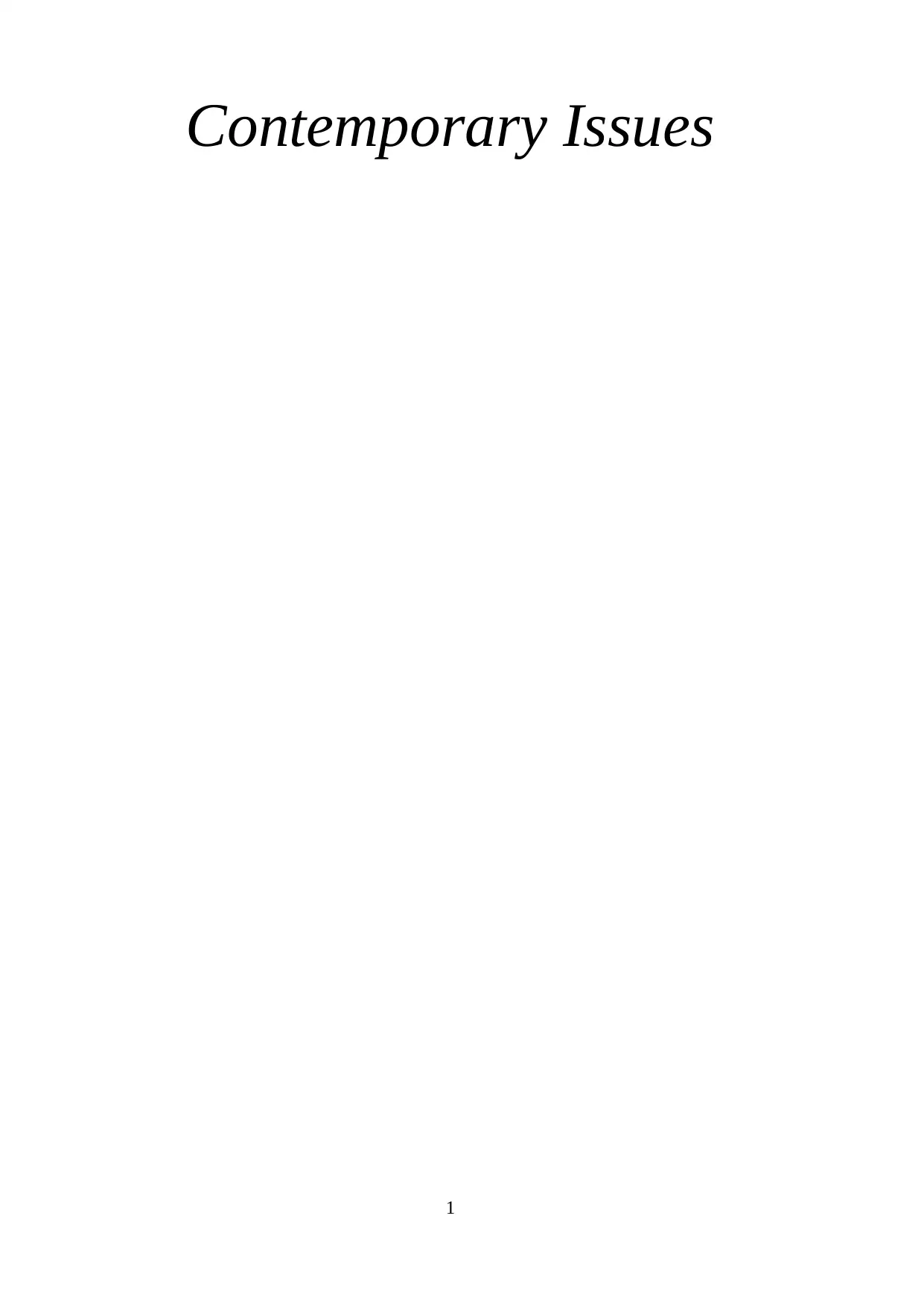
Contemporary Issues
1
1
Paraphrase This Document
Need a fresh take? Get an instant paraphrase of this document with our AI Paraphraser
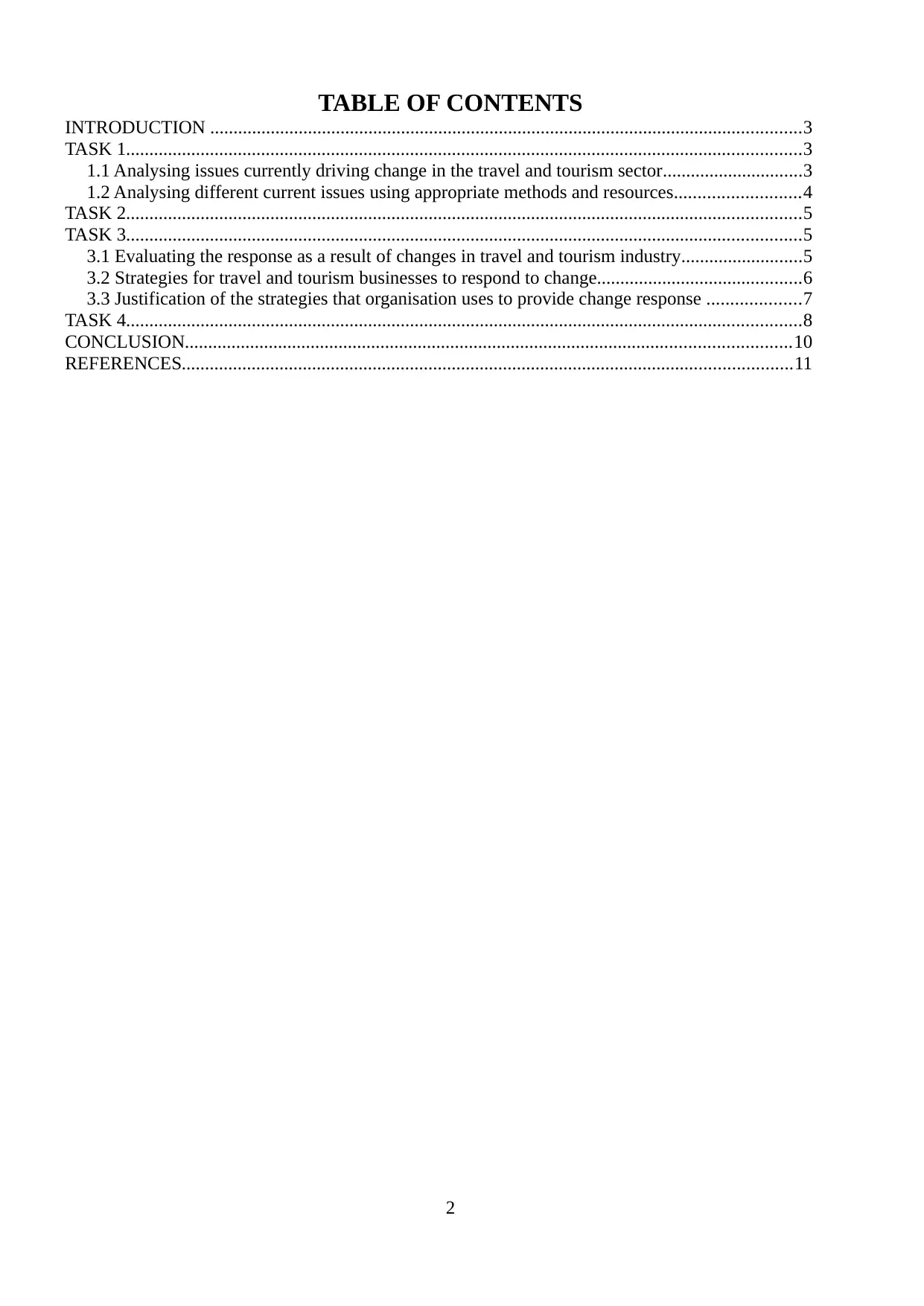
TABLE OF CONTENTS
INTRODUCTION ...............................................................................................................................3
TASK 1.................................................................................................................................................3
1.1 Analysing issues currently driving change in the travel and tourism sector..............................3
1.2 Analysing different current issues using appropriate methods and resources...........................4
TASK 2.................................................................................................................................................5
TASK 3.................................................................................................................................................5
3.1 Evaluating the response as a result of changes in travel and tourism industry..........................5
3.2 Strategies for travel and tourism businesses to respond to change............................................6
3.3 Justification of the strategies that organisation uses to provide change response ....................7
TASK 4.................................................................................................................................................8
CONCLUSION..................................................................................................................................10
REFERENCES...................................................................................................................................11
2
INTRODUCTION ...............................................................................................................................3
TASK 1.................................................................................................................................................3
1.1 Analysing issues currently driving change in the travel and tourism sector..............................3
1.2 Analysing different current issues using appropriate methods and resources...........................4
TASK 2.................................................................................................................................................5
TASK 3.................................................................................................................................................5
3.1 Evaluating the response as a result of changes in travel and tourism industry..........................5
3.2 Strategies for travel and tourism businesses to respond to change............................................6
3.3 Justification of the strategies that organisation uses to provide change response ....................7
TASK 4.................................................................................................................................................8
CONCLUSION..................................................................................................................................10
REFERENCES...................................................................................................................................11
2
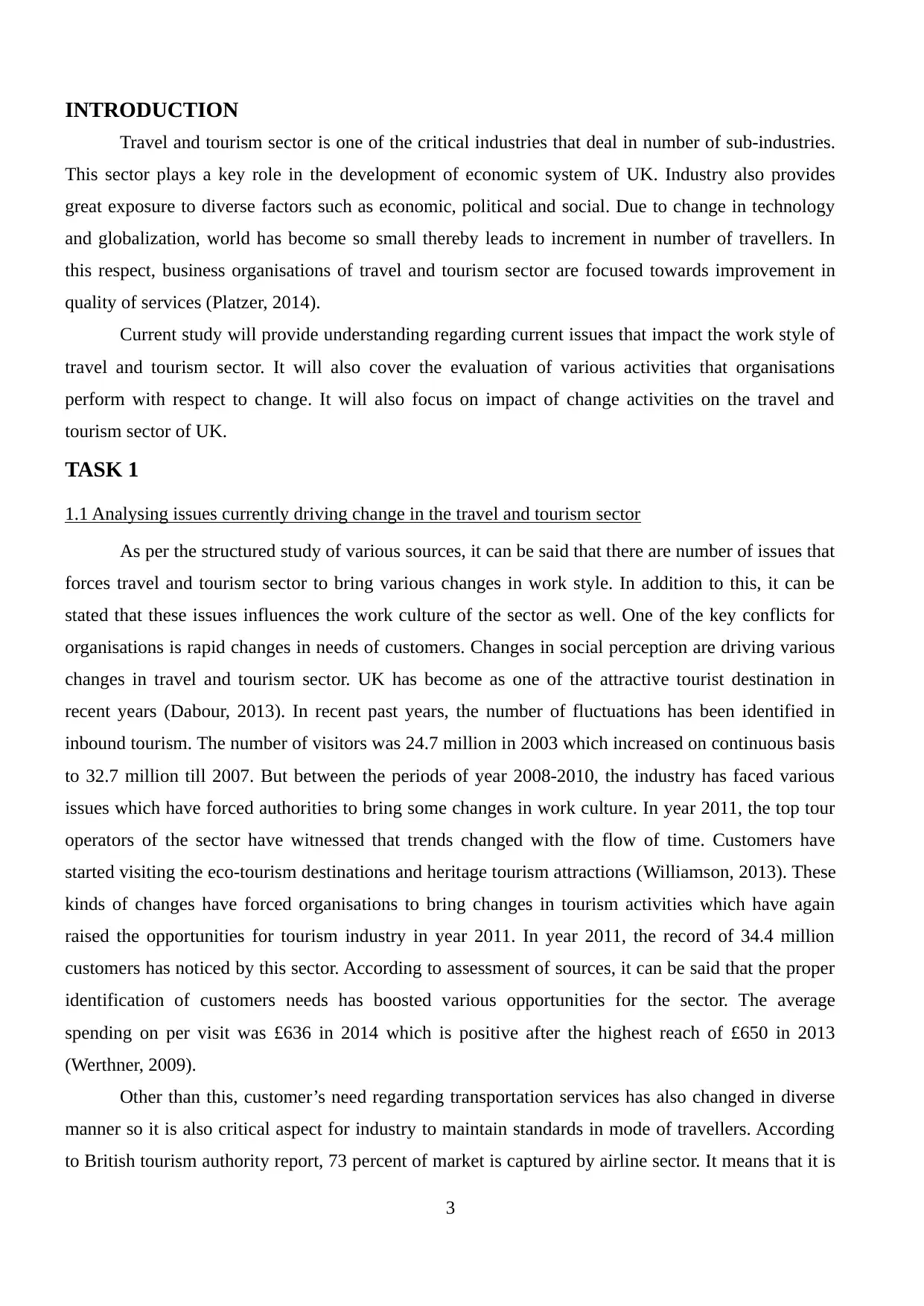
INTRODUCTION
Travel and tourism sector is one of the critical industries that deal in number of sub-industries.
This sector plays a key role in the development of economic system of UK. Industry also provides
great exposure to diverse factors such as economic, political and social. Due to change in technology
and globalization, world has become so small thereby leads to increment in number of travellers. In
this respect, business organisations of travel and tourism sector are focused towards improvement in
quality of services (Platzer, 2014).
Current study will provide understanding regarding current issues that impact the work style of
travel and tourism sector. It will also cover the evaluation of various activities that organisations
perform with respect to change. It will also focus on impact of change activities on the travel and
tourism sector of UK.
TASK 1
1.1 Analysing issues currently driving change in the travel and tourism sector
As per the structured study of various sources, it can be said that there are number of issues that
forces travel and tourism sector to bring various changes in work style. In addition to this, it can be
stated that these issues influences the work culture of the sector as well. One of the key conflicts for
organisations is rapid changes in needs of customers. Changes in social perception are driving various
changes in travel and tourism sector. UK has become as one of the attractive tourist destination in
recent years (Dabour, 2013). In recent past years, the number of fluctuations has been identified in
inbound tourism. The number of visitors was 24.7 million in 2003 which increased on continuous basis
to 32.7 million till 2007. But between the periods of year 2008-2010, the industry has faced various
issues which have forced authorities to bring some changes in work culture. In year 2011, the top tour
operators of the sector have witnessed that trends changed with the flow of time. Customers have
started visiting the eco-tourism destinations and heritage tourism attractions (Williamson, 2013). These
kinds of changes have forced organisations to bring changes in tourism activities which have again
raised the opportunities for tourism industry in year 2011. In year 2011, the record of 34.4 million
customers has noticed by this sector. According to assessment of sources, it can be said that the proper
identification of customers needs has boosted various opportunities for the sector. The average
spending on per visit was £636 in 2014 which is positive after the highest reach of £650 in 2013
(Werthner, 2009).
Other than this, customer’s need regarding transportation services has also changed in diverse
manner so it is also critical aspect for industry to maintain standards in mode of travellers. According
to British tourism authority report, 73 percent of market is captured by airline sector. It means that it is
3
Travel and tourism sector is one of the critical industries that deal in number of sub-industries.
This sector plays a key role in the development of economic system of UK. Industry also provides
great exposure to diverse factors such as economic, political and social. Due to change in technology
and globalization, world has become so small thereby leads to increment in number of travellers. In
this respect, business organisations of travel and tourism sector are focused towards improvement in
quality of services (Platzer, 2014).
Current study will provide understanding regarding current issues that impact the work style of
travel and tourism sector. It will also cover the evaluation of various activities that organisations
perform with respect to change. It will also focus on impact of change activities on the travel and
tourism sector of UK.
TASK 1
1.1 Analysing issues currently driving change in the travel and tourism sector
As per the structured study of various sources, it can be said that there are number of issues that
forces travel and tourism sector to bring various changes in work style. In addition to this, it can be
stated that these issues influences the work culture of the sector as well. One of the key conflicts for
organisations is rapid changes in needs of customers. Changes in social perception are driving various
changes in travel and tourism sector. UK has become as one of the attractive tourist destination in
recent years (Dabour, 2013). In recent past years, the number of fluctuations has been identified in
inbound tourism. The number of visitors was 24.7 million in 2003 which increased on continuous basis
to 32.7 million till 2007. But between the periods of year 2008-2010, the industry has faced various
issues which have forced authorities to bring some changes in work culture. In year 2011, the top tour
operators of the sector have witnessed that trends changed with the flow of time. Customers have
started visiting the eco-tourism destinations and heritage tourism attractions (Williamson, 2013). These
kinds of changes have forced organisations to bring changes in tourism activities which have again
raised the opportunities for tourism industry in year 2011. In year 2011, the record of 34.4 million
customers has noticed by this sector. According to assessment of sources, it can be said that the proper
identification of customers needs has boosted various opportunities for the sector. The average
spending on per visit was £636 in 2014 which is positive after the highest reach of £650 in 2013
(Werthner, 2009).
Other than this, customer’s need regarding transportation services has also changed in diverse
manner so it is also critical aspect for industry to maintain standards in mode of travellers. According
to British tourism authority report, 73 percent of market is captured by airline sector. It means that it is
3
⊘ This is a preview!⊘
Do you want full access?
Subscribe today to unlock all pages.

Trusted by 1+ million students worldwide
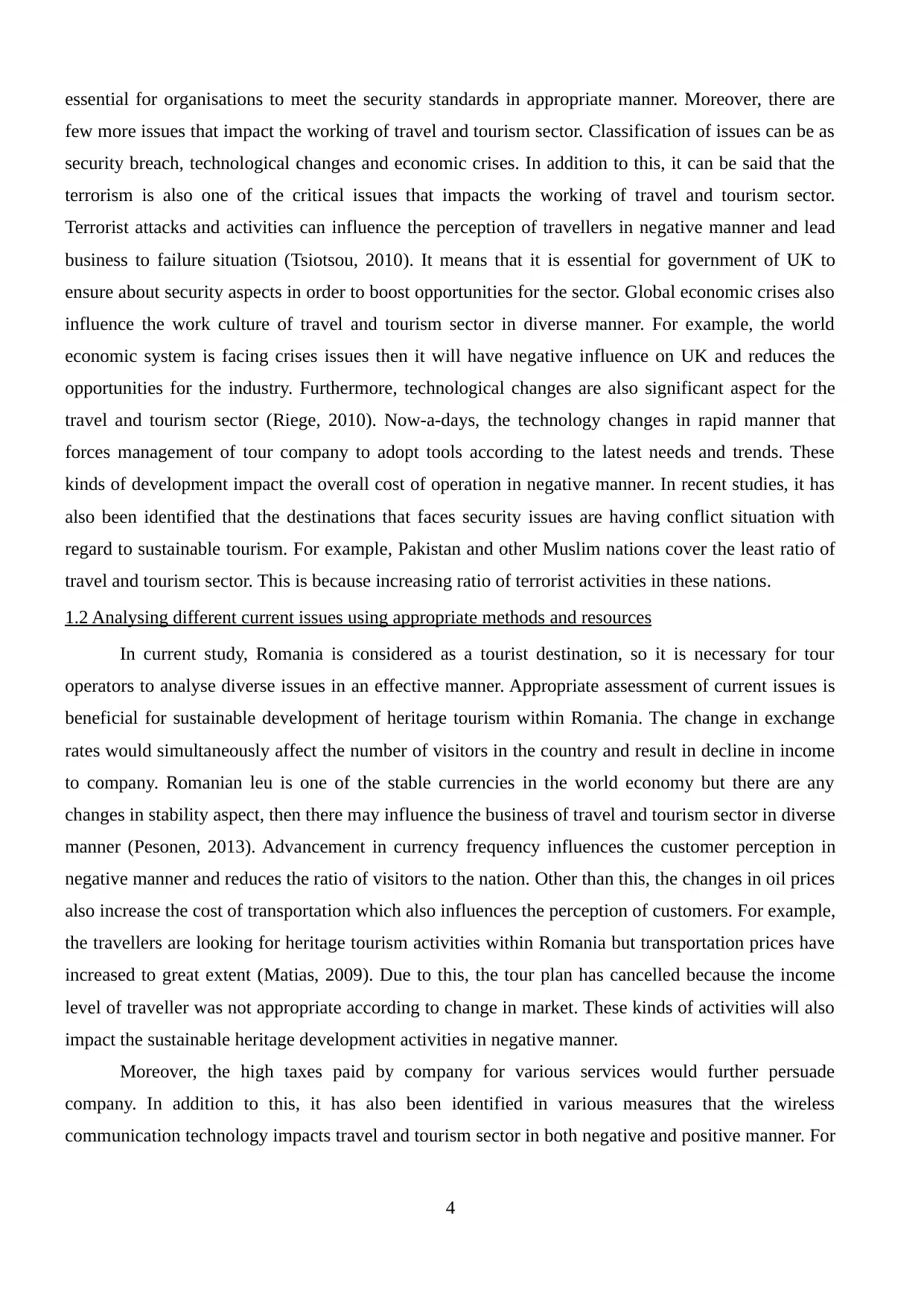
essential for organisations to meet the security standards in appropriate manner. Moreover, there are
few more issues that impact the working of travel and tourism sector. Classification of issues can be as
security breach, technological changes and economic crises. In addition to this, it can be said that the
terrorism is also one of the critical issues that impacts the working of travel and tourism sector.
Terrorist attacks and activities can influence the perception of travellers in negative manner and lead
business to failure situation (Tsiotsou, 2010). It means that it is essential for government of UK to
ensure about security aspects in order to boost opportunities for the sector. Global economic crises also
influence the work culture of travel and tourism sector in diverse manner. For example, the world
economic system is facing crises issues then it will have negative influence on UK and reduces the
opportunities for the industry. Furthermore, technological changes are also significant aspect for the
travel and tourism sector (Riege, 2010). Now-a-days, the technology changes in rapid manner that
forces management of tour company to adopt tools according to the latest needs and trends. These
kinds of development impact the overall cost of operation in negative manner. In recent studies, it has
also been identified that the destinations that faces security issues are having conflict situation with
regard to sustainable tourism. For example, Pakistan and other Muslim nations cover the least ratio of
travel and tourism sector. This is because increasing ratio of terrorist activities in these nations.
1.2 Analysing different current issues using appropriate methods and resources
In current study, Romania is considered as a tourist destination, so it is necessary for tour
operators to analyse diverse issues in an effective manner. Appropriate assessment of current issues is
beneficial for sustainable development of heritage tourism within Romania. The change in exchange
rates would simultaneously affect the number of visitors in the country and result in decline in income
to company. Romanian leu is one of the stable currencies in the world economy but there are any
changes in stability aspect, then there may influence the business of travel and tourism sector in diverse
manner (Pesonen, 2013). Advancement in currency frequency influences the customer perception in
negative manner and reduces the ratio of visitors to the nation. Other than this, the changes in oil prices
also increase the cost of transportation which also influences the perception of customers. For example,
the travellers are looking for heritage tourism activities within Romania but transportation prices have
increased to great extent (Matias, 2009). Due to this, the tour plan has cancelled because the income
level of traveller was not appropriate according to change in market. These kinds of activities will also
impact the sustainable heritage development activities in negative manner.
Moreover, the high taxes paid by company for various services would further persuade
company. In addition to this, it has also been identified in various measures that the wireless
communication technology impacts travel and tourism sector in both negative and positive manner. For
4
few more issues that impact the working of travel and tourism sector. Classification of issues can be as
security breach, technological changes and economic crises. In addition to this, it can be said that the
terrorism is also one of the critical issues that impacts the working of travel and tourism sector.
Terrorist attacks and activities can influence the perception of travellers in negative manner and lead
business to failure situation (Tsiotsou, 2010). It means that it is essential for government of UK to
ensure about security aspects in order to boost opportunities for the sector. Global economic crises also
influence the work culture of travel and tourism sector in diverse manner. For example, the world
economic system is facing crises issues then it will have negative influence on UK and reduces the
opportunities for the industry. Furthermore, technological changes are also significant aspect for the
travel and tourism sector (Riege, 2010). Now-a-days, the technology changes in rapid manner that
forces management of tour company to adopt tools according to the latest needs and trends. These
kinds of development impact the overall cost of operation in negative manner. In recent studies, it has
also been identified that the destinations that faces security issues are having conflict situation with
regard to sustainable tourism. For example, Pakistan and other Muslim nations cover the least ratio of
travel and tourism sector. This is because increasing ratio of terrorist activities in these nations.
1.2 Analysing different current issues using appropriate methods and resources
In current study, Romania is considered as a tourist destination, so it is necessary for tour
operators to analyse diverse issues in an effective manner. Appropriate assessment of current issues is
beneficial for sustainable development of heritage tourism within Romania. The change in exchange
rates would simultaneously affect the number of visitors in the country and result in decline in income
to company. Romanian leu is one of the stable currencies in the world economy but there are any
changes in stability aspect, then there may influence the business of travel and tourism sector in diverse
manner (Pesonen, 2013). Advancement in currency frequency influences the customer perception in
negative manner and reduces the ratio of visitors to the nation. Other than this, the changes in oil prices
also increase the cost of transportation which also influences the perception of customers. For example,
the travellers are looking for heritage tourism activities within Romania but transportation prices have
increased to great extent (Matias, 2009). Due to this, the tour plan has cancelled because the income
level of traveller was not appropriate according to change in market. These kinds of activities will also
impact the sustainable heritage development activities in negative manner.
Moreover, the high taxes paid by company for various services would further persuade
company. In addition to this, it has also been identified in various measures that the wireless
communication technology impacts travel and tourism sector in both negative and positive manner. For
4
Paraphrase This Document
Need a fresh take? Get an instant paraphrase of this document with our AI Paraphraser
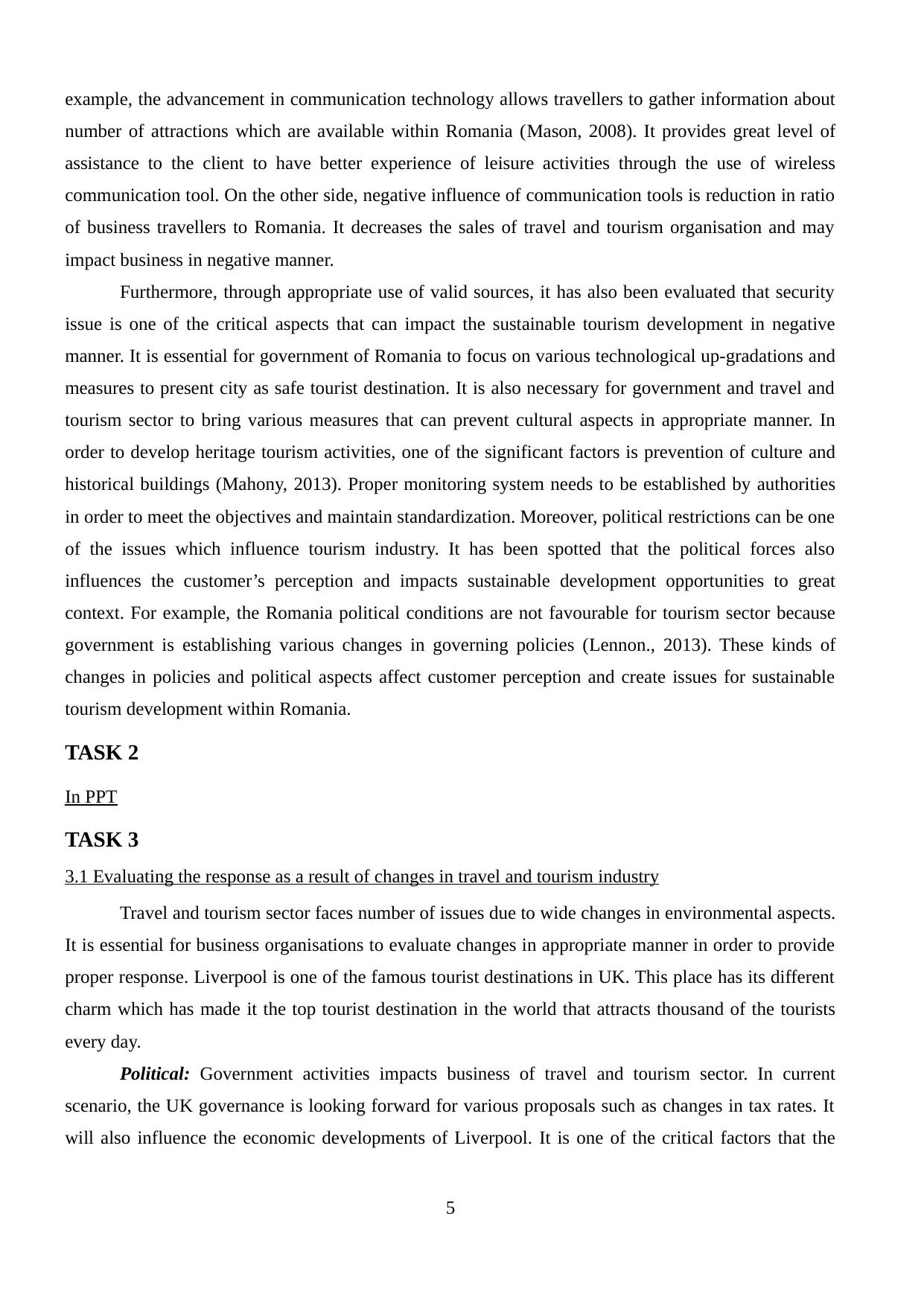
example, the advancement in communication technology allows travellers to gather information about
number of attractions which are available within Romania (Mason, 2008). It provides great level of
assistance to the client to have better experience of leisure activities through the use of wireless
communication tool. On the other side, negative influence of communication tools is reduction in ratio
of business travellers to Romania. It decreases the sales of travel and tourism organisation and may
impact business in negative manner.
Furthermore, through appropriate use of valid sources, it has also been evaluated that security
issue is one of the critical aspects that can impact the sustainable tourism development in negative
manner. It is essential for government of Romania to focus on various technological up-gradations and
measures to present city as safe tourist destination. It is also necessary for government and travel and
tourism sector to bring various measures that can prevent cultural aspects in appropriate manner. In
order to develop heritage tourism activities, one of the significant factors is prevention of culture and
historical buildings (Mahony, 2013). Proper monitoring system needs to be established by authorities
in order to meet the objectives and maintain standardization. Moreover, political restrictions can be one
of the issues which influence tourism industry. It has been spotted that the political forces also
influences the customer’s perception and impacts sustainable development opportunities to great
context. For example, the Romania political conditions are not favourable for tourism sector because
government is establishing various changes in governing policies (Lennon., 2013). These kinds of
changes in policies and political aspects affect customer perception and create issues for sustainable
tourism development within Romania.
TASK 2
In PPT
TASK 3
3.1 Evaluating the response as a result of changes in travel and tourism industry
Travel and tourism sector faces number of issues due to wide changes in environmental aspects.
It is essential for business organisations to evaluate changes in appropriate manner in order to provide
proper response. Liverpool is one of the famous tourist destinations in UK. This place has its different
charm which has made it the top tourist destination in the world that attracts thousand of the tourists
every day.
Political: Government activities impacts business of travel and tourism sector. In current
scenario, the UK governance is looking forward for various proposals such as changes in tax rates. It
will also influence the economic developments of Liverpool. It is one of the critical factors that the
5
number of attractions which are available within Romania (Mason, 2008). It provides great level of
assistance to the client to have better experience of leisure activities through the use of wireless
communication tool. On the other side, negative influence of communication tools is reduction in ratio
of business travellers to Romania. It decreases the sales of travel and tourism organisation and may
impact business in negative manner.
Furthermore, through appropriate use of valid sources, it has also been evaluated that security
issue is one of the critical aspects that can impact the sustainable tourism development in negative
manner. It is essential for government of Romania to focus on various technological up-gradations and
measures to present city as safe tourist destination. It is also necessary for government and travel and
tourism sector to bring various measures that can prevent cultural aspects in appropriate manner. In
order to develop heritage tourism activities, one of the significant factors is prevention of culture and
historical buildings (Mahony, 2013). Proper monitoring system needs to be established by authorities
in order to meet the objectives and maintain standardization. Moreover, political restrictions can be one
of the issues which influence tourism industry. It has been spotted that the political forces also
influences the customer’s perception and impacts sustainable development opportunities to great
context. For example, the Romania political conditions are not favourable for tourism sector because
government is establishing various changes in governing policies (Lennon., 2013). These kinds of
changes in policies and political aspects affect customer perception and create issues for sustainable
tourism development within Romania.
TASK 2
In PPT
TASK 3
3.1 Evaluating the response as a result of changes in travel and tourism industry
Travel and tourism sector faces number of issues due to wide changes in environmental aspects.
It is essential for business organisations to evaluate changes in appropriate manner in order to provide
proper response. Liverpool is one of the famous tourist destinations in UK. This place has its different
charm which has made it the top tourist destination in the world that attracts thousand of the tourists
every day.
Political: Government activities impacts business of travel and tourism sector. In current
scenario, the UK governance is looking forward for various proposals such as changes in tax rates. It
will also influence the economic developments of Liverpool. It is one of the critical factors that the
5
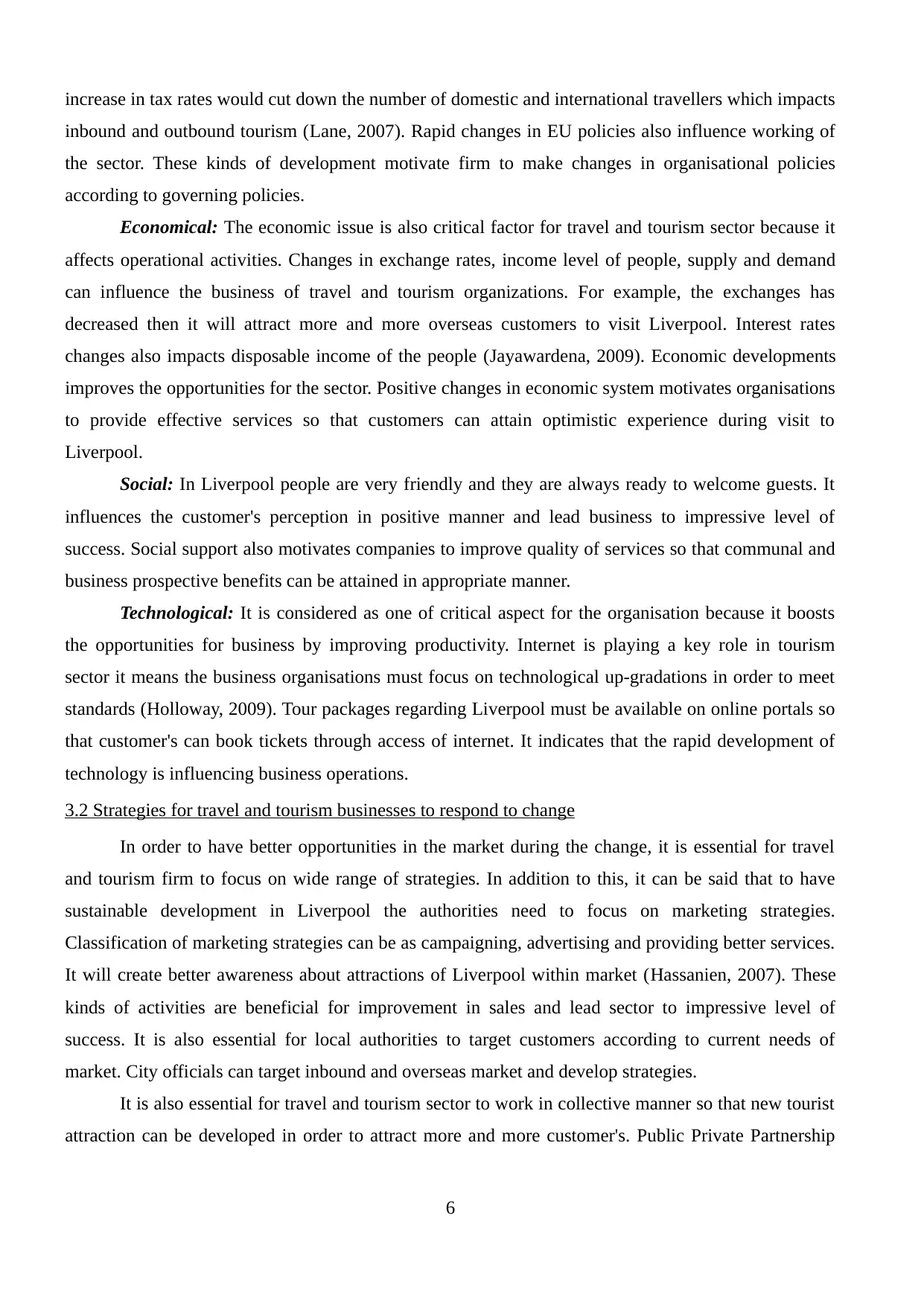
increase in tax rates would cut down the number of domestic and international travellers which impacts
inbound and outbound tourism (Lane, 2007). Rapid changes in EU policies also influence working of
the sector. These kinds of development motivate firm to make changes in organisational policies
according to governing policies.
Economical: The economic issue is also critical factor for travel and tourism sector because it
affects operational activities. Changes in exchange rates, income level of people, supply and demand
can influence the business of travel and tourism organizations. For example, the exchanges has
decreased then it will attract more and more overseas customers to visit Liverpool. Interest rates
changes also impacts disposable income of the people (Jayawardena, 2009). Economic developments
improves the opportunities for the sector. Positive changes in economic system motivates organisations
to provide effective services so that customers can attain optimistic experience during visit to
Liverpool.
Social: In Liverpool people are very friendly and they are always ready to welcome guests. It
influences the customer's perception in positive manner and lead business to impressive level of
success. Social support also motivates companies to improve quality of services so that communal and
business prospective benefits can be attained in appropriate manner.
Technological: It is considered as one of critical aspect for the organisation because it boosts
the opportunities for business by improving productivity. Internet is playing a key role in tourism
sector it means the business organisations must focus on technological up-gradations in order to meet
standards (Holloway, 2009). Tour packages regarding Liverpool must be available on online portals so
that customer's can book tickets through access of internet. It indicates that the rapid development of
technology is influencing business operations.
3.2 Strategies for travel and tourism businesses to respond to change
In order to have better opportunities in the market during the change, it is essential for travel
and tourism firm to focus on wide range of strategies. In addition to this, it can be said that to have
sustainable development in Liverpool the authorities need to focus on marketing strategies.
Classification of marketing strategies can be as campaigning, advertising and providing better services.
It will create better awareness about attractions of Liverpool within market (Hassanien, 2007). These
kinds of activities are beneficial for improvement in sales and lead sector to impressive level of
success. It is also essential for local authorities to target customers according to current needs of
market. City officials can target inbound and overseas market and develop strategies.
It is also essential for travel and tourism sector to work in collective manner so that new tourist
attraction can be developed in order to attract more and more customer's. Public Private Partnership
6
inbound and outbound tourism (Lane, 2007). Rapid changes in EU policies also influence working of
the sector. These kinds of development motivate firm to make changes in organisational policies
according to governing policies.
Economical: The economic issue is also critical factor for travel and tourism sector because it
affects operational activities. Changes in exchange rates, income level of people, supply and demand
can influence the business of travel and tourism organizations. For example, the exchanges has
decreased then it will attract more and more overseas customers to visit Liverpool. Interest rates
changes also impacts disposable income of the people (Jayawardena, 2009). Economic developments
improves the opportunities for the sector. Positive changes in economic system motivates organisations
to provide effective services so that customers can attain optimistic experience during visit to
Liverpool.
Social: In Liverpool people are very friendly and they are always ready to welcome guests. It
influences the customer's perception in positive manner and lead business to impressive level of
success. Social support also motivates companies to improve quality of services so that communal and
business prospective benefits can be attained in appropriate manner.
Technological: It is considered as one of critical aspect for the organisation because it boosts
the opportunities for business by improving productivity. Internet is playing a key role in tourism
sector it means the business organisations must focus on technological up-gradations in order to meet
standards (Holloway, 2009). Tour packages regarding Liverpool must be available on online portals so
that customer's can book tickets through access of internet. It indicates that the rapid development of
technology is influencing business operations.
3.2 Strategies for travel and tourism businesses to respond to change
In order to have better opportunities in the market during the change, it is essential for travel
and tourism firm to focus on wide range of strategies. In addition to this, it can be said that to have
sustainable development in Liverpool the authorities need to focus on marketing strategies.
Classification of marketing strategies can be as campaigning, advertising and providing better services.
It will create better awareness about attractions of Liverpool within market (Hassanien, 2007). These
kinds of activities are beneficial for improvement in sales and lead sector to impressive level of
success. It is also essential for local authorities to target customers according to current needs of
market. City officials can target inbound and overseas market and develop strategies.
It is also essential for travel and tourism sector to work in collective manner so that new tourist
attraction can be developed in order to attract more and more customer's. Public Private Partnership
6
⊘ This is a preview!⊘
Do you want full access?
Subscribe today to unlock all pages.

Trusted by 1+ million students worldwide
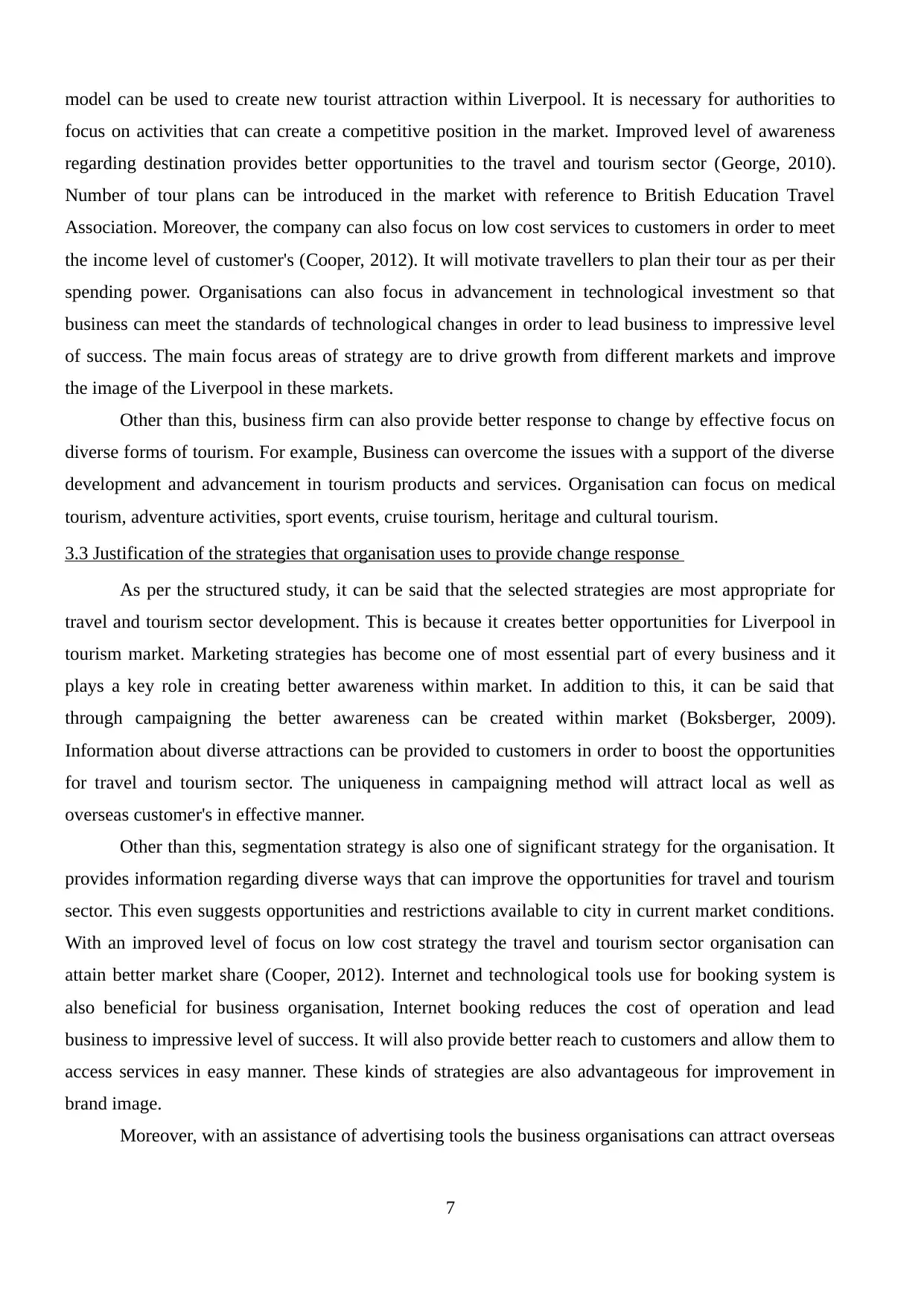
model can be used to create new tourist attraction within Liverpool. It is necessary for authorities to
focus on activities that can create a competitive position in the market. Improved level of awareness
regarding destination provides better opportunities to the travel and tourism sector (George, 2010).
Number of tour plans can be introduced in the market with reference to British Education Travel
Association. Moreover, the company can also focus on low cost services to customers in order to meet
the income level of customer's (Cooper, 2012). It will motivate travellers to plan their tour as per their
spending power. Organisations can also focus in advancement in technological investment so that
business can meet the standards of technological changes in order to lead business to impressive level
of success. The main focus areas of strategy are to drive growth from different markets and improve
the image of the Liverpool in these markets.
Other than this, business firm can also provide better response to change by effective focus on
diverse forms of tourism. For example, Business can overcome the issues with a support of the diverse
development and advancement in tourism products and services. Organisation can focus on medical
tourism, adventure activities, sport events, cruise tourism, heritage and cultural tourism.
3.3 Justification of the strategies that organisation uses to provide change response
As per the structured study, it can be said that the selected strategies are most appropriate for
travel and tourism sector development. This is because it creates better opportunities for Liverpool in
tourism market. Marketing strategies has become one of most essential part of every business and it
plays a key role in creating better awareness within market. In addition to this, it can be said that
through campaigning the better awareness can be created within market (Boksberger, 2009).
Information about diverse attractions can be provided to customers in order to boost the opportunities
for travel and tourism sector. The uniqueness in campaigning method will attract local as well as
overseas customer's in effective manner.
Other than this, segmentation strategy is also one of significant strategy for the organisation. It
provides information regarding diverse ways that can improve the opportunities for travel and tourism
sector. This even suggests opportunities and restrictions available to city in current market conditions.
With an improved level of focus on low cost strategy the travel and tourism sector organisation can
attain better market share (Cooper, 2012). Internet and technological tools use for booking system is
also beneficial for business organisation, Internet booking reduces the cost of operation and lead
business to impressive level of success. It will also provide better reach to customers and allow them to
access services in easy manner. These kinds of strategies are also advantageous for improvement in
brand image.
Moreover, with an assistance of advertising tools the business organisations can attract overseas
7
focus on activities that can create a competitive position in the market. Improved level of awareness
regarding destination provides better opportunities to the travel and tourism sector (George, 2010).
Number of tour plans can be introduced in the market with reference to British Education Travel
Association. Moreover, the company can also focus on low cost services to customers in order to meet
the income level of customer's (Cooper, 2012). It will motivate travellers to plan their tour as per their
spending power. Organisations can also focus in advancement in technological investment so that
business can meet the standards of technological changes in order to lead business to impressive level
of success. The main focus areas of strategy are to drive growth from different markets and improve
the image of the Liverpool in these markets.
Other than this, business firm can also provide better response to change by effective focus on
diverse forms of tourism. For example, Business can overcome the issues with a support of the diverse
development and advancement in tourism products and services. Organisation can focus on medical
tourism, adventure activities, sport events, cruise tourism, heritage and cultural tourism.
3.3 Justification of the strategies that organisation uses to provide change response
As per the structured study, it can be said that the selected strategies are most appropriate for
travel and tourism sector development. This is because it creates better opportunities for Liverpool in
tourism market. Marketing strategies has become one of most essential part of every business and it
plays a key role in creating better awareness within market. In addition to this, it can be said that
through campaigning the better awareness can be created within market (Boksberger, 2009).
Information about diverse attractions can be provided to customers in order to boost the opportunities
for travel and tourism sector. The uniqueness in campaigning method will attract local as well as
overseas customer's in effective manner.
Other than this, segmentation strategy is also one of significant strategy for the organisation. It
provides information regarding diverse ways that can improve the opportunities for travel and tourism
sector. This even suggests opportunities and restrictions available to city in current market conditions.
With an improved level of focus on low cost strategy the travel and tourism sector organisation can
attain better market share (Cooper, 2012). Internet and technological tools use for booking system is
also beneficial for business organisation, Internet booking reduces the cost of operation and lead
business to impressive level of success. It will also provide better reach to customers and allow them to
access services in easy manner. These kinds of strategies are also advantageous for improvement in
brand image.
Moreover, with an assistance of advertising tools the business organisations can attract overseas
7
Paraphrase This Document
Need a fresh take? Get an instant paraphrase of this document with our AI Paraphraser
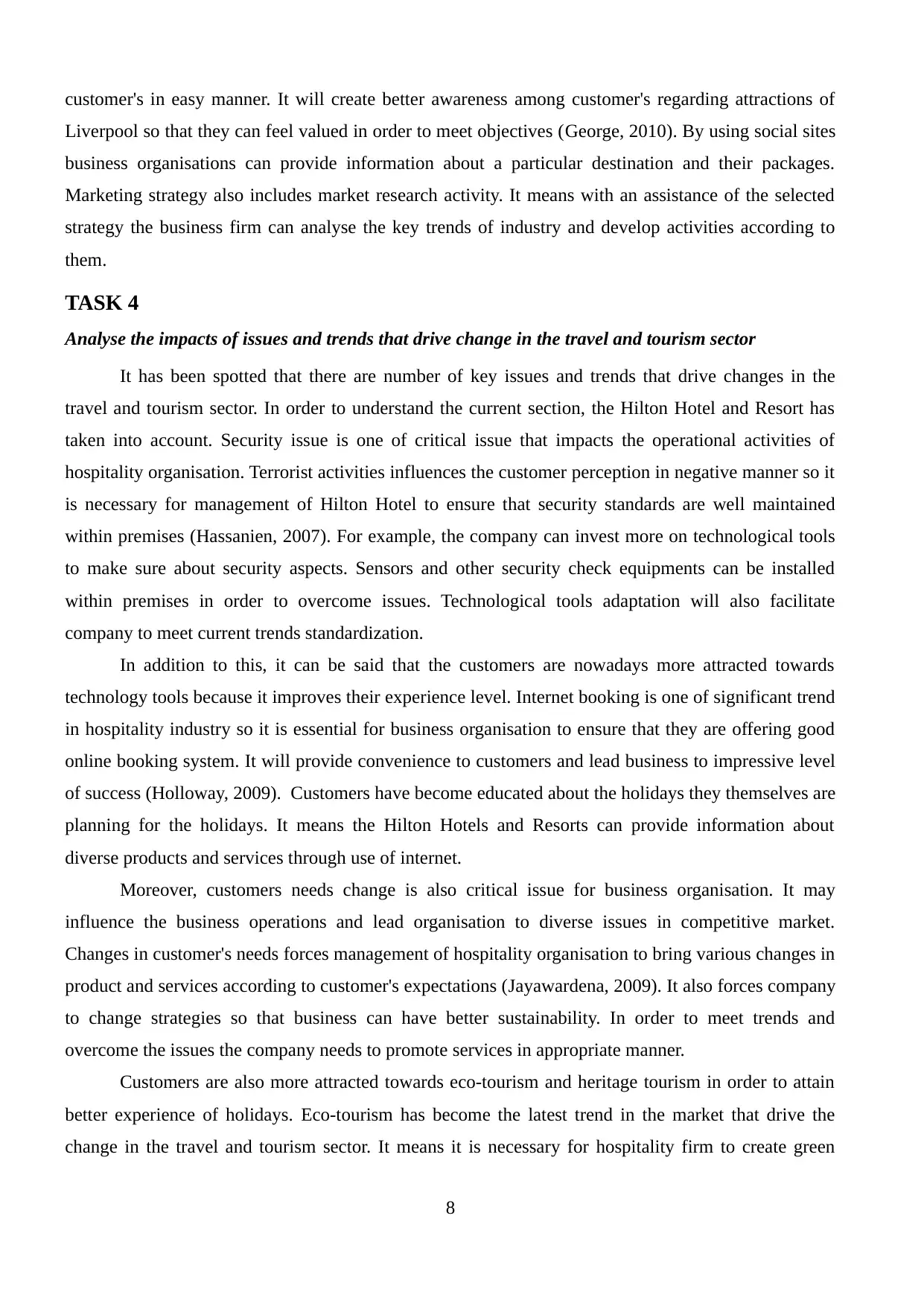
customer's in easy manner. It will create better awareness among customer's regarding attractions of
Liverpool so that they can feel valued in order to meet objectives (George, 2010). By using social sites
business organisations can provide information about a particular destination and their packages.
Marketing strategy also includes market research activity. It means with an assistance of the selected
strategy the business firm can analyse the key trends of industry and develop activities according to
them.
TASK 4
Analyse the impacts of issues and trends that drive change in the travel and tourism sector
It has been spotted that there are number of key issues and trends that drive changes in the
travel and tourism sector. In order to understand the current section, the Hilton Hotel and Resort has
taken into account. Security issue is one of critical issue that impacts the operational activities of
hospitality organisation. Terrorist activities influences the customer perception in negative manner so it
is necessary for management of Hilton Hotel to ensure that security standards are well maintained
within premises (Hassanien, 2007). For example, the company can invest more on technological tools
to make sure about security aspects. Sensors and other security check equipments can be installed
within premises in order to overcome issues. Technological tools adaptation will also facilitate
company to meet current trends standardization.
In addition to this, it can be said that the customers are nowadays more attracted towards
technology tools because it improves their experience level. Internet booking is one of significant trend
in hospitality industry so it is essential for business organisation to ensure that they are offering good
online booking system. It will provide convenience to customers and lead business to impressive level
of success (Holloway, 2009). Customers have become educated about the holidays they themselves are
planning for the holidays. It means the Hilton Hotels and Resorts can provide information about
diverse products and services through use of internet.
Moreover, customers needs change is also critical issue for business organisation. It may
influence the business operations and lead organisation to diverse issues in competitive market.
Changes in customer's needs forces management of hospitality organisation to bring various changes in
product and services according to customer's expectations (Jayawardena, 2009). It also forces company
to change strategies so that business can have better sustainability. In order to meet trends and
overcome the issues the company needs to promote services in appropriate manner.
Customers are also more attracted towards eco-tourism and heritage tourism in order to attain
better experience of holidays. Eco-tourism has become the latest trend in the market that drive the
change in the travel and tourism sector. It means it is necessary for hospitality firm to create green
8
Liverpool so that they can feel valued in order to meet objectives (George, 2010). By using social sites
business organisations can provide information about a particular destination and their packages.
Marketing strategy also includes market research activity. It means with an assistance of the selected
strategy the business firm can analyse the key trends of industry and develop activities according to
them.
TASK 4
Analyse the impacts of issues and trends that drive change in the travel and tourism sector
It has been spotted that there are number of key issues and trends that drive changes in the
travel and tourism sector. In order to understand the current section, the Hilton Hotel and Resort has
taken into account. Security issue is one of critical issue that impacts the operational activities of
hospitality organisation. Terrorist activities influences the customer perception in negative manner so it
is necessary for management of Hilton Hotel to ensure that security standards are well maintained
within premises (Hassanien, 2007). For example, the company can invest more on technological tools
to make sure about security aspects. Sensors and other security check equipments can be installed
within premises in order to overcome issues. Technological tools adaptation will also facilitate
company to meet current trends standardization.
In addition to this, it can be said that the customers are nowadays more attracted towards
technology tools because it improves their experience level. Internet booking is one of significant trend
in hospitality industry so it is essential for business organisation to ensure that they are offering good
online booking system. It will provide convenience to customers and lead business to impressive level
of success (Holloway, 2009). Customers have become educated about the holidays they themselves are
planning for the holidays. It means the Hilton Hotels and Resorts can provide information about
diverse products and services through use of internet.
Moreover, customers needs change is also critical issue for business organisation. It may
influence the business operations and lead organisation to diverse issues in competitive market.
Changes in customer's needs forces management of hospitality organisation to bring various changes in
product and services according to customer's expectations (Jayawardena, 2009). It also forces company
to change strategies so that business can have better sustainability. In order to meet trends and
overcome the issues the company needs to promote services in appropriate manner.
Customers are also more attracted towards eco-tourism and heritage tourism in order to attain
better experience of holidays. Eco-tourism has become the latest trend in the market that drive the
change in the travel and tourism sector. It means it is necessary for hospitality firm to create green
8
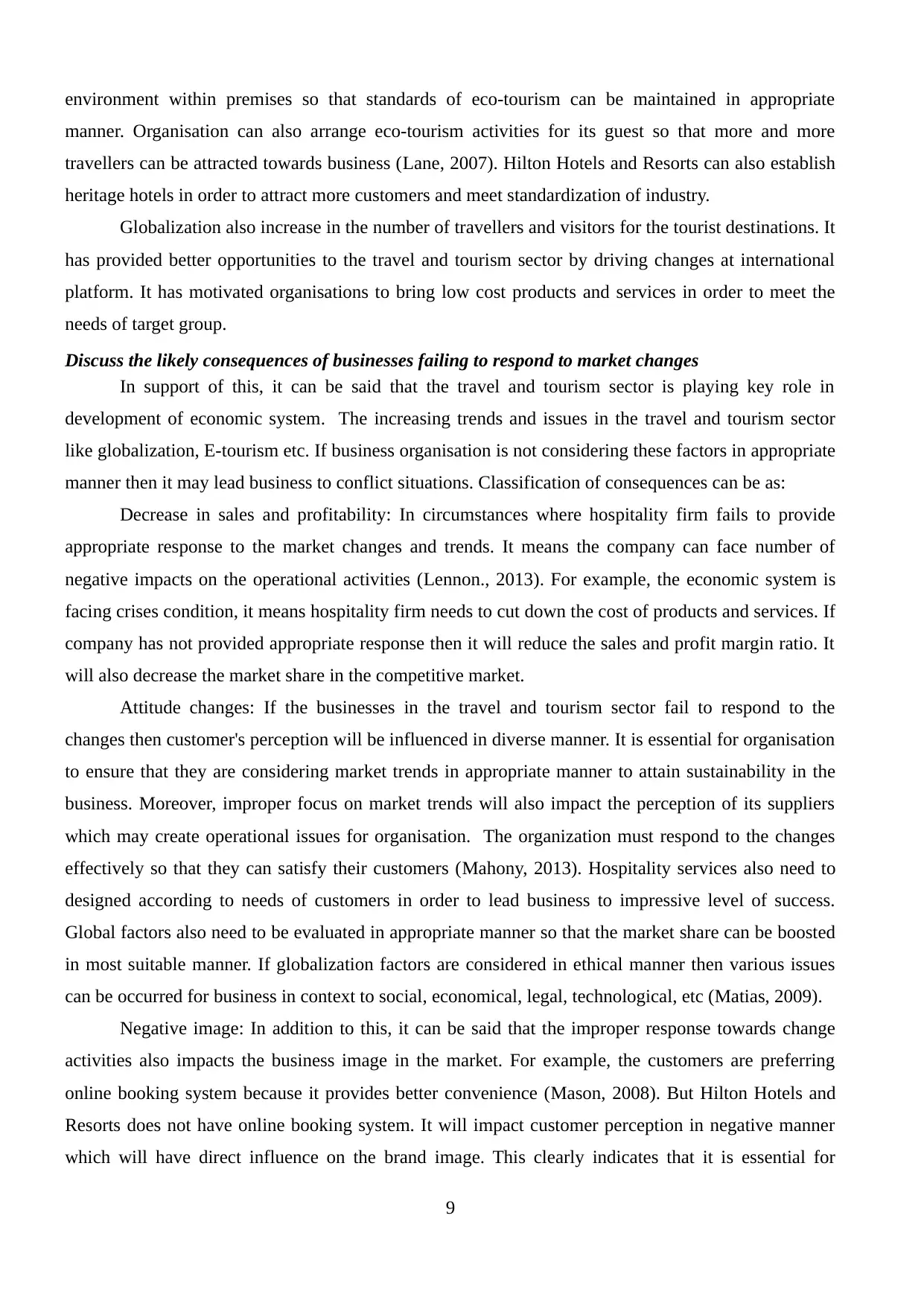
environment within premises so that standards of eco-tourism can be maintained in appropriate
manner. Organisation can also arrange eco-tourism activities for its guest so that more and more
travellers can be attracted towards business (Lane, 2007). Hilton Hotels and Resorts can also establish
heritage hotels in order to attract more customers and meet standardization of industry.
Globalization also increase in the number of travellers and visitors for the tourist destinations. It
has provided better opportunities to the travel and tourism sector by driving changes at international
platform. It has motivated organisations to bring low cost products and services in order to meet the
needs of target group.
Discuss the likely consequences of businesses failing to respond to market changes
In support of this, it can be said that the travel and tourism sector is playing key role in
development of economic system. The increasing trends and issues in the travel and tourism sector
like globalization, E-tourism etc. If business organisation is not considering these factors in appropriate
manner then it may lead business to conflict situations. Classification of consequences can be as:
Decrease in sales and profitability: In circumstances where hospitality firm fails to provide
appropriate response to the market changes and trends. It means the company can face number of
negative impacts on the operational activities (Lennon., 2013). For example, the economic system is
facing crises condition, it means hospitality firm needs to cut down the cost of products and services. If
company has not provided appropriate response then it will reduce the sales and profit margin ratio. It
will also decrease the market share in the competitive market.
Attitude changes: If the businesses in the travel and tourism sector fail to respond to the
changes then customer's perception will be influenced in diverse manner. It is essential for organisation
to ensure that they are considering market trends in appropriate manner to attain sustainability in the
business. Moreover, improper focus on market trends will also impact the perception of its suppliers
which may create operational issues for organisation. The organization must respond to the changes
effectively so that they can satisfy their customers (Mahony, 2013). Hospitality services also need to
designed according to needs of customers in order to lead business to impressive level of success.
Global factors also need to be evaluated in appropriate manner so that the market share can be boosted
in most suitable manner. If globalization factors are considered in ethical manner then various issues
can be occurred for business in context to social, economical, legal, technological, etc (Matias, 2009).
Negative image: In addition to this, it can be said that the improper response towards change
activities also impacts the business image in the market. For example, the customers are preferring
online booking system because it provides better convenience (Mason, 2008). But Hilton Hotels and
Resorts does not have online booking system. It will impact customer perception in negative manner
which will have direct influence on the brand image. This clearly indicates that it is essential for
9
manner. Organisation can also arrange eco-tourism activities for its guest so that more and more
travellers can be attracted towards business (Lane, 2007). Hilton Hotels and Resorts can also establish
heritage hotels in order to attract more customers and meet standardization of industry.
Globalization also increase in the number of travellers and visitors for the tourist destinations. It
has provided better opportunities to the travel and tourism sector by driving changes at international
platform. It has motivated organisations to bring low cost products and services in order to meet the
needs of target group.
Discuss the likely consequences of businesses failing to respond to market changes
In support of this, it can be said that the travel and tourism sector is playing key role in
development of economic system. The increasing trends and issues in the travel and tourism sector
like globalization, E-tourism etc. If business organisation is not considering these factors in appropriate
manner then it may lead business to conflict situations. Classification of consequences can be as:
Decrease in sales and profitability: In circumstances where hospitality firm fails to provide
appropriate response to the market changes and trends. It means the company can face number of
negative impacts on the operational activities (Lennon., 2013). For example, the economic system is
facing crises condition, it means hospitality firm needs to cut down the cost of products and services. If
company has not provided appropriate response then it will reduce the sales and profit margin ratio. It
will also decrease the market share in the competitive market.
Attitude changes: If the businesses in the travel and tourism sector fail to respond to the
changes then customer's perception will be influenced in diverse manner. It is essential for organisation
to ensure that they are considering market trends in appropriate manner to attain sustainability in the
business. Moreover, improper focus on market trends will also impact the perception of its suppliers
which may create operational issues for organisation. The organization must respond to the changes
effectively so that they can satisfy their customers (Mahony, 2013). Hospitality services also need to
designed according to needs of customers in order to lead business to impressive level of success.
Global factors also need to be evaluated in appropriate manner so that the market share can be boosted
in most suitable manner. If globalization factors are considered in ethical manner then various issues
can be occurred for business in context to social, economical, legal, technological, etc (Matias, 2009).
Negative image: In addition to this, it can be said that the improper response towards change
activities also impacts the business image in the market. For example, the customers are preferring
online booking system because it provides better convenience (Mason, 2008). But Hilton Hotels and
Resorts does not have online booking system. It will impact customer perception in negative manner
which will have direct influence on the brand image. This clearly indicates that it is essential for
9
⊘ This is a preview!⊘
Do you want full access?
Subscribe today to unlock all pages.

Trusted by 1+ million students worldwide
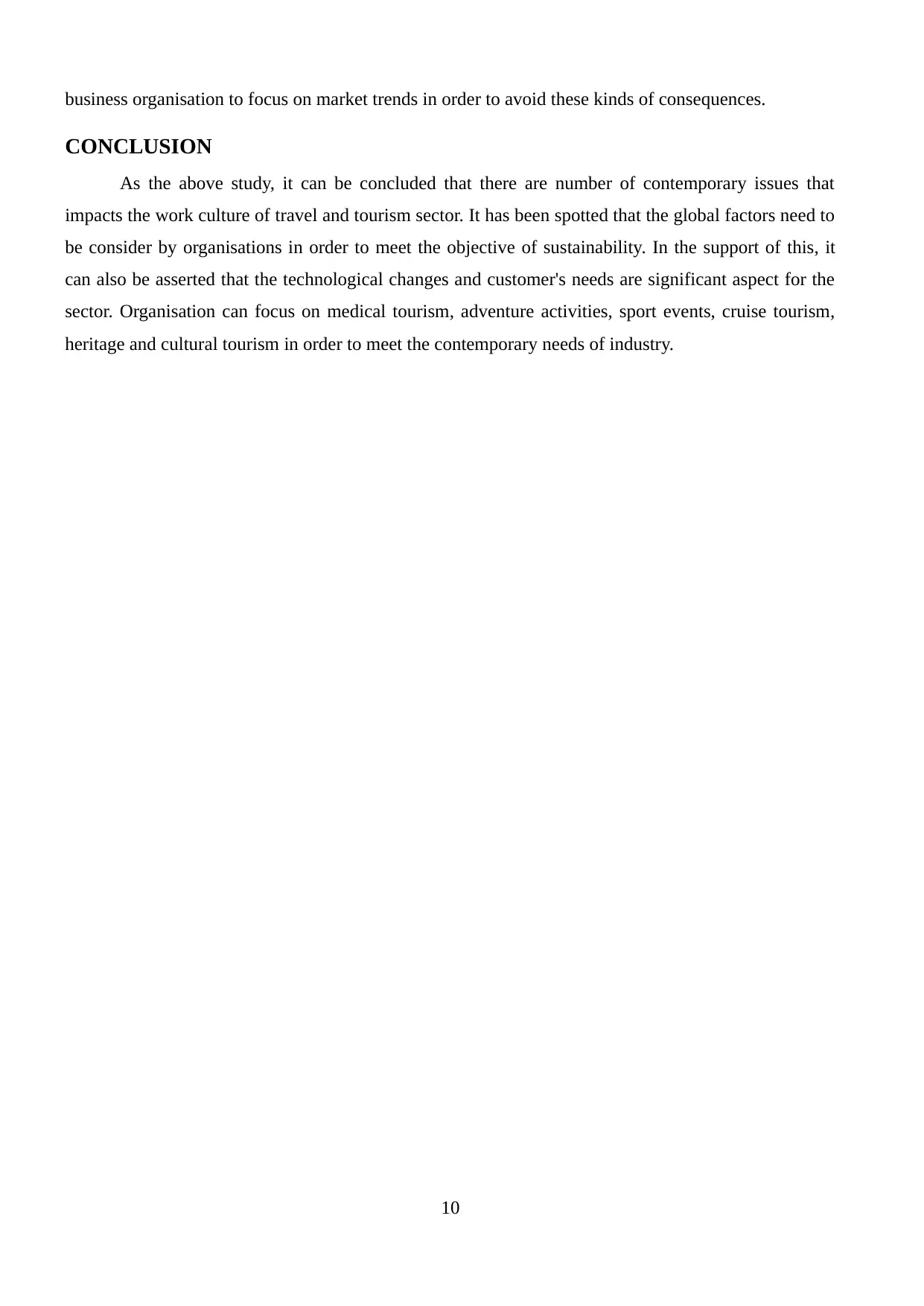
business organisation to focus on market trends in order to avoid these kinds of consequences.
CONCLUSION
As the above study, it can be concluded that there are number of contemporary issues that
impacts the work culture of travel and tourism sector. It has been spotted that the global factors need to
be consider by organisations in order to meet the objective of sustainability. In the support of this, it
can also be asserted that the technological changes and customer's needs are significant aspect for the
sector. Organisation can focus on medical tourism, adventure activities, sport events, cruise tourism,
heritage and cultural tourism in order to meet the contemporary needs of industry.
10
CONCLUSION
As the above study, it can be concluded that there are number of contemporary issues that
impacts the work culture of travel and tourism sector. It has been spotted that the global factors need to
be consider by organisations in order to meet the objective of sustainability. In the support of this, it
can also be asserted that the technological changes and customer's needs are significant aspect for the
sector. Organisation can focus on medical tourism, adventure activities, sport events, cruise tourism,
heritage and cultural tourism in order to meet the contemporary needs of industry.
10
Paraphrase This Document
Need a fresh take? Get an instant paraphrase of this document with our AI Paraphraser
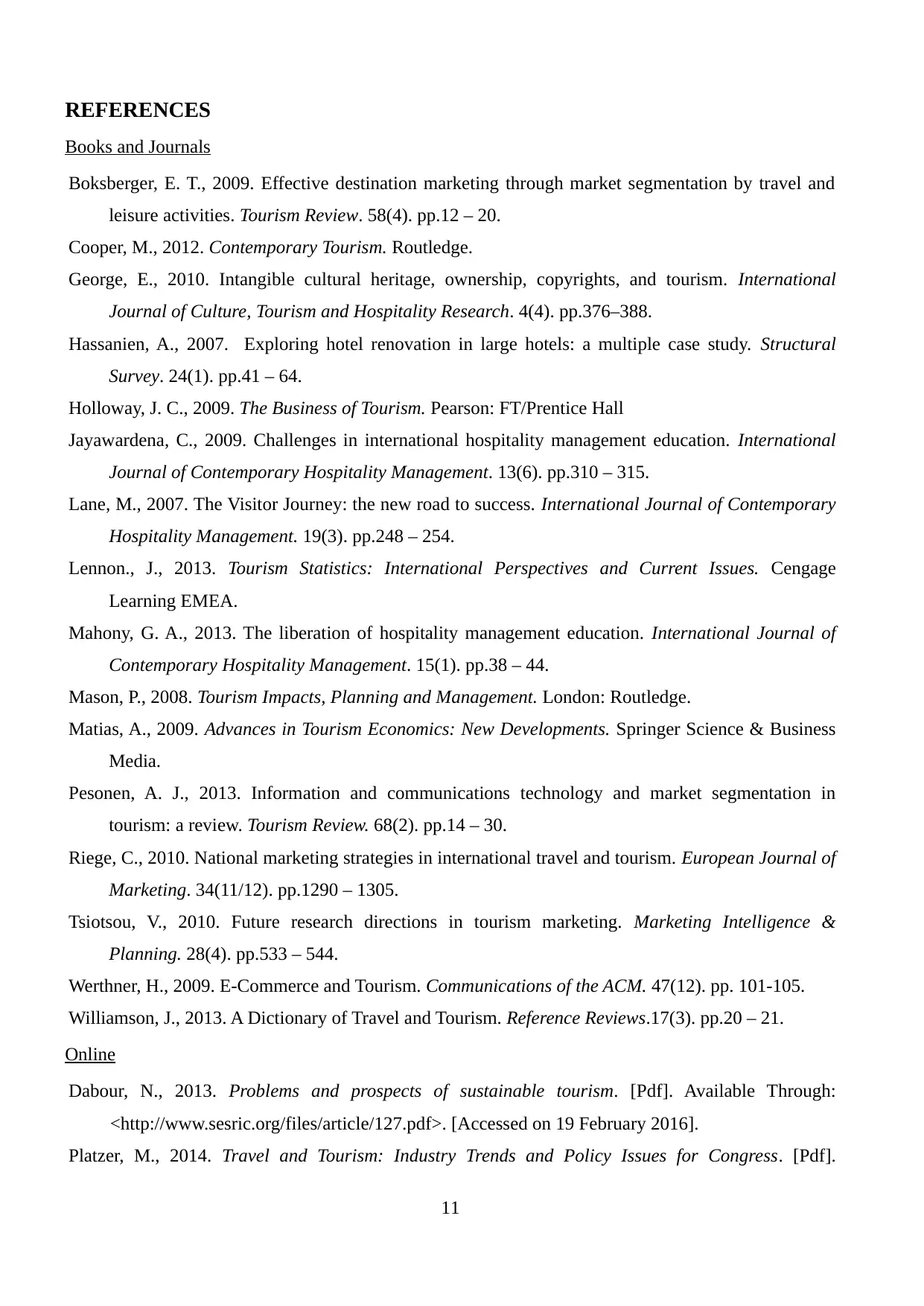
REFERENCES
Books and Journals
Boksberger, E. T., 2009. Effective destination marketing through market segmentation by travel and
leisure activities. Tourism Review. 58(4). pp.12 – 20.
Cooper, M., 2012. Contemporary Tourism. Routledge.
George, E., 2010. Intangible cultural heritage, ownership, copyrights, and tourism. International
Journal of Culture, Tourism and Hospitality Research. 4(4). pp.376–388.
Hassanien, A., 2007. Exploring hotel renovation in large hotels: a multiple case study. Structural
Survey. 24(1). pp.41 – 64.
Holloway, J. C., 2009. The Business of Tourism. Pearson: FT/Prentice Hall
Jayawardena, C., 2009. Challenges in international hospitality management education. International
Journal of Contemporary Hospitality Management. 13(6). pp.310 – 315.
Lane, M., 2007. The Visitor Journey: the new road to success. International Journal of Contemporary
Hospitality Management. 19(3). pp.248 – 254.
Lennon., J., 2013. Tourism Statistics: International Perspectives and Current Issues. Cengage
Learning EMEA.
Mahony, G. A., 2013. The liberation of hospitality management education. International Journal of
Contemporary Hospitality Management. 15(1). pp.38 – 44.
Mason, P., 2008. Tourism Impacts, Planning and Management. London: Routledge.
Matias, A., 2009. Advances in Tourism Economics: New Developments. Springer Science & Business
Media.
Pesonen, A. J., 2013. Information and communications technology and market segmentation in
tourism: a review. Tourism Review. 68(2). pp.14 – 30.
Riege, C., 2010. National marketing strategies in international travel and tourism. European Journal of
Marketing. 34(11/12). pp.1290 – 1305.
Tsiotsou, V., 2010. Future research directions in tourism marketing. Marketing Intelligence &
Planning. 28(4). pp.533 – 544.
Werthner, H., 2009. E-Commerce and Tourism. Communications of the ACM. 47(12). pp. 101-105.
Williamson, J., 2013. A Dictionary of Travel and Tourism. Reference Reviews.17(3). pp.20 – 21.
Online
Dabour, N., 2013. Problems and prospects of sustainable tourism. [Pdf]. Available Through:
<http://www.sesric.org/files/article/127.pdf>. [Accessed on 19 February 2016].
Platzer, M., 2014. Travel and Tourism: Industry Trends and Policy Issues for Congress. [Pdf].
11
Books and Journals
Boksberger, E. T., 2009. Effective destination marketing through market segmentation by travel and
leisure activities. Tourism Review. 58(4). pp.12 – 20.
Cooper, M., 2012. Contemporary Tourism. Routledge.
George, E., 2010. Intangible cultural heritage, ownership, copyrights, and tourism. International
Journal of Culture, Tourism and Hospitality Research. 4(4). pp.376–388.
Hassanien, A., 2007. Exploring hotel renovation in large hotels: a multiple case study. Structural
Survey. 24(1). pp.41 – 64.
Holloway, J. C., 2009. The Business of Tourism. Pearson: FT/Prentice Hall
Jayawardena, C., 2009. Challenges in international hospitality management education. International
Journal of Contemporary Hospitality Management. 13(6). pp.310 – 315.
Lane, M., 2007. The Visitor Journey: the new road to success. International Journal of Contemporary
Hospitality Management. 19(3). pp.248 – 254.
Lennon., J., 2013. Tourism Statistics: International Perspectives and Current Issues. Cengage
Learning EMEA.
Mahony, G. A., 2013. The liberation of hospitality management education. International Journal of
Contemporary Hospitality Management. 15(1). pp.38 – 44.
Mason, P., 2008. Tourism Impacts, Planning and Management. London: Routledge.
Matias, A., 2009. Advances in Tourism Economics: New Developments. Springer Science & Business
Media.
Pesonen, A. J., 2013. Information and communications technology and market segmentation in
tourism: a review. Tourism Review. 68(2). pp.14 – 30.
Riege, C., 2010. National marketing strategies in international travel and tourism. European Journal of
Marketing. 34(11/12). pp.1290 – 1305.
Tsiotsou, V., 2010. Future research directions in tourism marketing. Marketing Intelligence &
Planning. 28(4). pp.533 – 544.
Werthner, H., 2009. E-Commerce and Tourism. Communications of the ACM. 47(12). pp. 101-105.
Williamson, J., 2013. A Dictionary of Travel and Tourism. Reference Reviews.17(3). pp.20 – 21.
Online
Dabour, N., 2013. Problems and prospects of sustainable tourism. [Pdf]. Available Through:
<http://www.sesric.org/files/article/127.pdf>. [Accessed on 19 February 2016].
Platzer, M., 2014. Travel and Tourism: Industry Trends and Policy Issues for Congress. [Pdf].
11
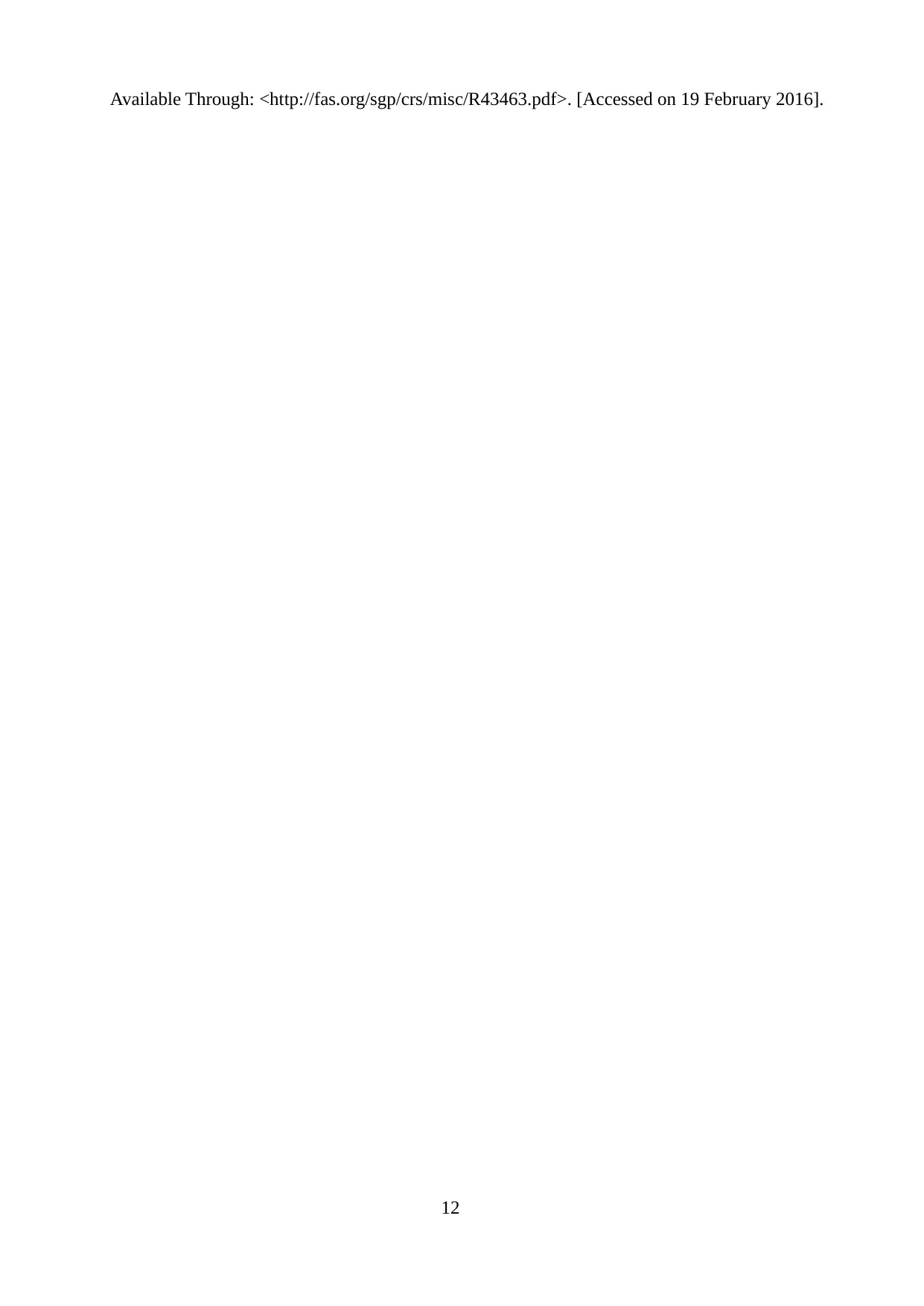
Available Through: <http://fas.org/sgp/crs/misc/R43463.pdf>. [Accessed on 19 February 2016].
12
12
⊘ This is a preview!⊘
Do you want full access?
Subscribe today to unlock all pages.

Trusted by 1+ million students worldwide
1 out of 13
Related Documents
Your All-in-One AI-Powered Toolkit for Academic Success.
+13062052269
info@desklib.com
Available 24*7 on WhatsApp / Email
![[object Object]](/_next/static/media/star-bottom.7253800d.svg)
Unlock your academic potential
Copyright © 2020–2025 A2Z Services. All Rights Reserved. Developed and managed by ZUCOL.





